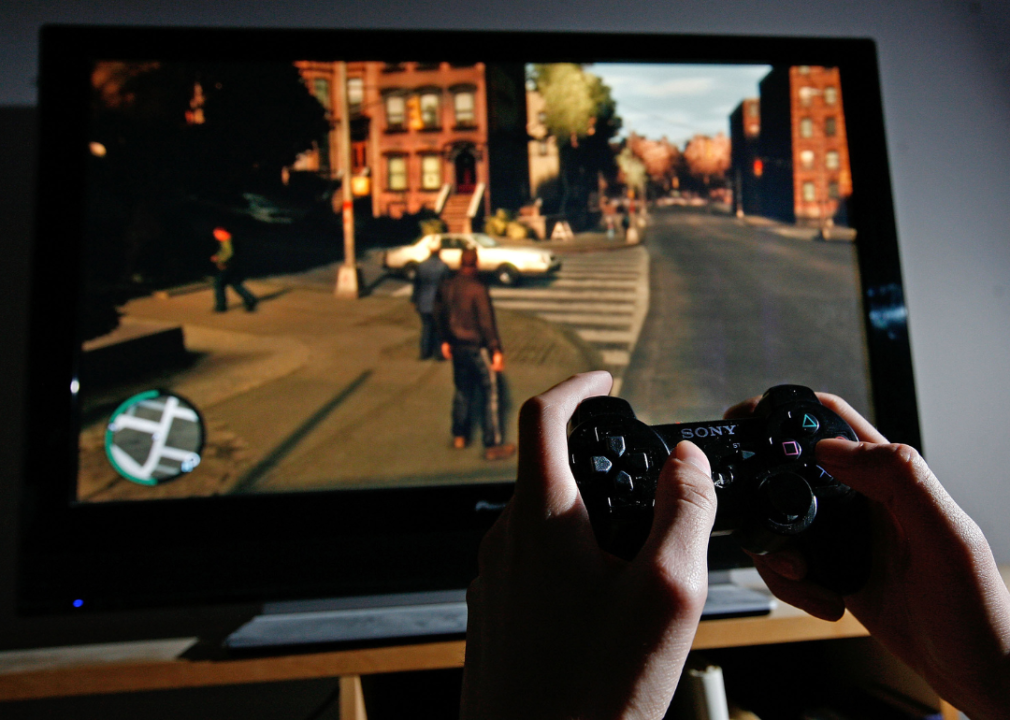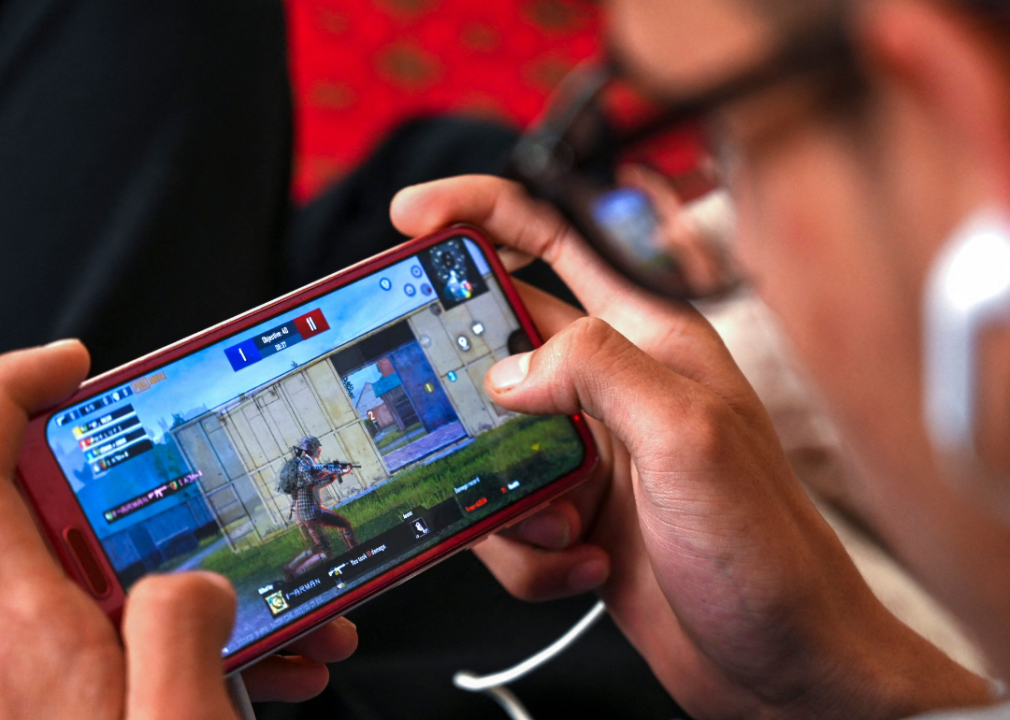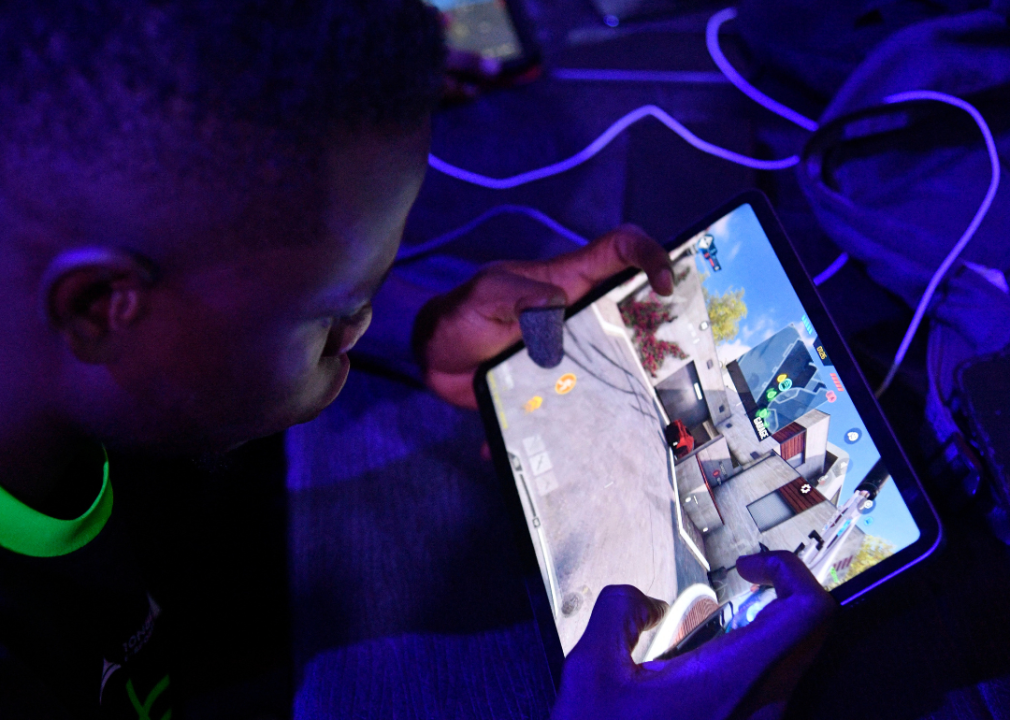15 Gaming Terms That Are Now Part of Everyday Conversation

Video games are a nascent and blossoming art form compared to mediums like literature, film, and music.
Despite an exhibition by the Smithsonian titled “The Art of Video Games,” the question about its place in the art world remains a contentious issue. Even now, new comments still pop up on critic Robert Ebert’s more-than-decadelong post refuting the notion. Though some might deny its spot among creative arts, the financials speak for themselves.
In 2023 alone, the video game industry produced over $100 billion in revenue and attracted an estimated 212.6 million Americans (about 65% of the population) to play video games at least an hour a week, according to the Entertainment Software Association.
With mascot figures like Mario and Sonic the Hedgehog becoming as recognizable as Mickey Mouse, video games are becoming more prevalent in popular culture. Mainstream audiences are also becoming more aware of video game properties through acclaimed film and television adaptations like “The Last of Us” and “Fallout.”
Despite video gaming’s financial and cultural growth, the hobby and activity are still relatively niche, with an audience that skews more toward younger generations. According to the ESA, 3 out of 4 people in the United States who play video games are at most 44 years old.
Like any unique hobby with this much appeal, new and evolving words emerge from gaming. Some of these terms stem from familiar words and expressions but have taken a life of their own within gaming contexts. Some might even find their way back to mainstream use after time. Consider how sports terminology like “slam dunk” or “throw in the towel” have made it into everyday vocabulary.
To help nongamers get into the spirit of things, Bonuses.com curated a list of popular gaming terms that have started popping up in everyday conversation, offering definitions, original-use cases, and additional context. Read on to see which of these new vocabulary words you’ve already heard out in the open and how to properly use them.
Buff

Developers of video games, especially competitive ones, spend much of their time adjusting characters’ traits, abilities, and weapons to create a balanced gaming experience. Sometimes weapons or abilities are too weak, so a developer will “buff” it to make it stronger or more viable. Using “buff” as a verb instead of an adjective (being muscular) stems from early online role-playing games where “buffing” a character would temporarily enhance them. Nowadays, the verb is a blanket term for improving anything permanently.
Camping

In video games that emphasize movement and strategy, “camping” is a sometimes derogatory term referring to the tactic of finding a certain spot and remaining static in that spot, generally hidden from other players. This position may give the camping player a perceived unfair strategic advantage—although it isn’t considered cheating. Debates have raged for decades on whether or not the strategy is legitimate or an annoyance, but the strategy for sure doesn’t require the use of a tent.
GG

Sports players are used to saying “good game” to the opposing team members after a match, and a similar sportsmanlike mentality exists in the video gaming space. Like using the initialisms “lol” or “omg,” the term “gg” or “GG” is a quick message to type once a match ends. It can also be used in real-life sports and uttered verbally. “GG” is also a fun term to say sarcastically—if you didn’t study for a test, for example, you could express “GG” to indicate that you’re ready to accept your fate.
Griefer

Unfortunately, not everyone who joins an online multiplayer game is there for good intentions. “Griefers” are players who act in bad faith, often bullying other players and exploiting gameplay mechanics to annoy and disrupt their experience. Griefers might intentionally attack allies, destroy or disrupt their progress, or be noisy in voice chats—as less extreme examples. The term “griefing” can be used in any context where someone is purposefully annoying others and engaging in public toxic behavior.
Grinding

Many video games have characters gain “experience points” or XP by completing tasks or defeating enemies, leveling up, and gaining additional skills or higher stats once they’ve gained enough experience. “Grinding” involves doing repetitive tasks to keep leveling up, and players may feel rewarded when reaching their goal despite the monotonous and chorelike nature of the tasks. Outside of gaming, “grinding” can be applied to work and academic life, such as “grinding” for an upcoming exam or project.
Nerf

While the verb “buff” refers to strengthening a character, weapon, or ability in a video game for the sake of balance, “nerfing” something means to weaken it. The term stems from the Nerf brand of foam-based weapons with soft and spongy ammunition. “Nerf” was first commonly used in massively multiplayer online role-playing games, some with very unbalanced elements. The term can also be used in any non-gaming context for something that becomes less useful or less effective.
Newb/noob

The word “newbie” has a long history of referring to people new or unfamiliar with an environment or concept. The word is a slang term for a newcomer, but it can still be shortened to “Newb.” Online spaces further reduced the word to “noob” or “n00b,” the latter being an example of leet (or “l33t”) speak practices of using numbers in the spelling of words. Calling a player a “n00b” is a somewhat mean-spirited way to distinguish players from those who are more experienced, and leet terms like “n00b” and “pwn” (a misspelling of “own,” meaning to defeat someone) occasionally find their way in verbal conversations outside of online text chats.
NPC

Nonplayable characters, or NPCs, are video game characters the player doesn’t control. In role-playing games, many NPCs simply stand idly, only existing to give you a quest or objectives or information and having no agency to themselves. In other types of video games, NPCs might be controlled by artificial intelligence and directly interact with the player in gameplay, although humans don’t control them. In real life, people have used the term NPC to insult anyone they deem to lack original thoughts, individuality, or importance. In 2018, the term has even seeped into the political world.
OP

If a character or ability is deemed too strong, players will likely call them overpowered or “OP.” Generally, developers respond to community concerns of an OP weapon or character by nerfing, or weakening it. If someone in real life is extremely skilled at something, or if they seem extraordinarily lucky in general, one could joke that they are “OP.” The term isn’t to be confused with another “OP” term, which means “original poster,” which refers to a person who begins a thread, post, or discussion topic on online forums or social media when replying to said post.
Protip

A protip is a piece of advice given to someone in a gaming context, but the word is often used sarcastically, the same way one can call someone a genius or “Einstein” if they say something erroneous or are missing something clear-cut. Gaming magazines and guides would give protips on how to defeat enemies and do other in-game tasks. Sometimes, these protips would state the obvious, so a parody of a protip used to mock someone playing a game would sound like “Protip: Shoot the weak point to beat the boss” or “Protip: Press fire to shoot bullets out of your gun.”
Rage quit

Emotions can run high while playing a competitive video game, so some players lose their temper and exit the game abruptly. It isn’t considered sportsmanlike behavior, and as the term “rage quit” implies, it comes out of anger. In games with voice chat, players might shout or even throw their controller or smash their keyboard in rage. Outside of gaming, one could “rage quit” any task by abandoning it out of frustration and anger. In business, a person could “rage quit” their job by resigning very suddenly.
Sidequest

Large games in genres like action-adventure and role-playing will have some primary objectives, but to fill in the time, these games might have something called a side quest. These are usually tasks given by NPCs and might involve the player exploring a part of the world they might have missed if they hadn’t accepted it. Side quests are usually optional but may yield rewards. In real life, one could go on a “side quest” going grocery shopping while having a “main objective” of commuting home from work, for example.
Skill issue

Competitive video games require a lot of practice and skill to be successful, and naturally, there is a lot of trash talk and verbal jabbing between players. If a player is missing their shots in a shooting game, they might blame their monitor or controller, or perhaps they’ll blame it on weapon rebalancing from the developers. But taunters might say that it’s simply a “skill issue” and suggest they were never good in the first place. That term could come up in real life. Suddenly don’t remember how to whistle well? That’s a skill issue.
Spawn

To spawn is to produce or generate something, and the term is similarly used in video games. NPCs can spawn in certain programmed points, or player characters can spawn on a strategic spot when entering a game. The term “respawn” refers to when a player character dies and comes back. Objects and nonplayer characters can also respawn, depending on the game. If something comes back after disappearing or going away in real life, one could joke that it “respawned.
Speedrun

The art of speedrunning has devoted video game players who find exploits and perfect their techniques to finish a game as quickly as possible. Sometimes, a speedrun involves using glitches, but speedrunning always requires practice from anyone who hopes to set a record. Entire events like Games Done Quick center on speedrunners performing their craft in front of audiences. When performing tasks at home or at work, people might express that they are “speedrunning” washing the dishes or writing a report.
Written by Chris Compendio – Chris is a freelance writer and journalist in the fields of video games, film, television, and politics. Story editing by Carren Jao. Additional editing by Kelly Glass. Copy editing by Paris Close. Photo selection by Lacy Kerrick.